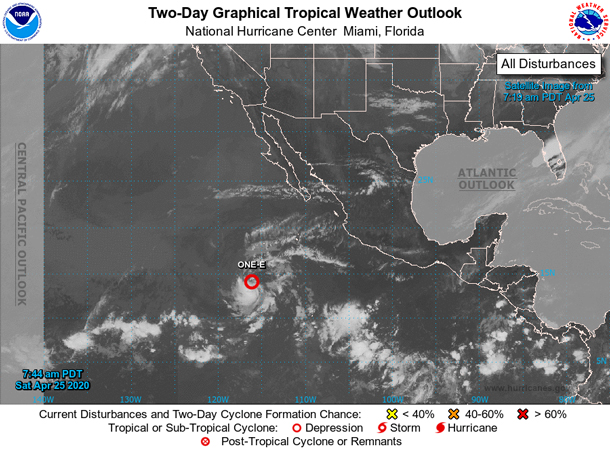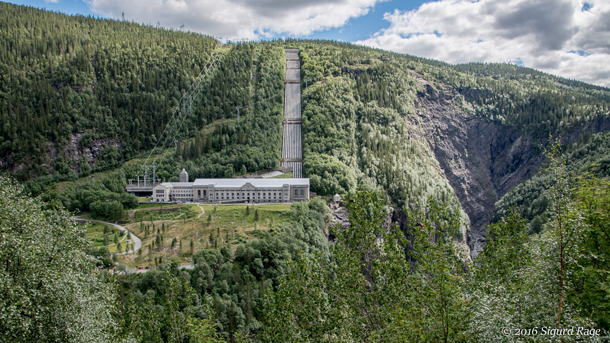Beyond the Headlines
Air Date: Week of May 1, 2020

Tropical Depression One-E formed in the Eastern Pacific south of Baja California on April 25th, the first recorded tropical depression in April in that region. (Photo: National Hurricane Center/Central Pacific Hurricane Center/National Oceonographic and Atmospheric Administration, Public Domain)
In this week’s installment of Beyond the Headlines, Environmental Health News Editor Peter Dykstra updates Host Steve Curwood on the planet’s ominous climate change signals. Meanwhile, the plastics industry has won a victory with rollbacks of single-use plastic bag bans in California. Finally, the pair takes a look back at this week in 1940, when the German forces during World War II seized a hydroelectric dam and heavy water processing facility in Vemork, Norway, as part of their bid to make an atom bomb.
Transcript
BASCOMB: It’s Living on Earth. I’m Bobby Bascomb.
CURWOOD: And I’m Steve Curwood
CURWOOD: And today for our look beyond the headlines we turn as usual to Peter Dykstra. Peter's an editor with Environmental Health News that's ehn.org and dailyclimate.org, on the line from Atlanta, Georgia there, Peter, how are you doing?
DYKSTRA: Hey, Steve, one piece of news that came out this past week is a little bit disturbing in terms of what we might expect for hurricane and typhoon season because on April 25th, the first Tropical Depression in the eastern Pacific that's ever happened in the month of April, briefly showed up south of Baja California. It didn't last more than a day, it never touched land, but it did touch the worry button for people who see the hurricane and typhoon season, potentially expanding.
CURWOOD: And on the other side, in the Gulf of Mexico, there's been unusually warm water that's already been blamed for the spate of really difficult tornadoes we've seen in the southern United States. I guess things are getting warmer.
DYKSTRA: Things are getting warmer. And that's been a trend not only in the Gulf of Mexico but in the Atlantic coast off the southeast US for years. There's also information this past week from Europe, that 11 of the 12 hottest years ever recorded on the European continent have happened since the year 2000.
CURWOOD: Hmm, what else do you have for us today? Any better news?
DYKSTRA: Not today, Steve. Sorry. We'll go back to 2016. When California prohibited the use of those thin, single-use plastic bags at stores, they instituted a 10 cent fee if customers don't bring their own bags, but with Coronavirus, dominating the news and dominating public concern. The industry pushed back and they got California to roll back that fee for 60 days because the industry says customers bags could be a transmission device to bring Coronavirus to grocery workers.
CURWOOD: Hmm. Well, that reminds me of the year 2001 when the chemical industry used 9/11 to rollback those disclosure laws that had been passed so that local residents and fire departments and environmental journalists could know what chemical plants were using and storing.
DYKSTRA: That's right. There's a history as you suggest of big industries that had been fighting tooth and nail against regulation, using a disaster, to blunt that regulation. It's a cynical twist on that old notion that every crisis is someone's opportunity. Also, the plastics industry, citing Coronavirus, has asked Congress for a billion-dollar bailout even though the price of natural gas, the main feedstock for plastic, is at a major major low.
CURWOOD: Okay, Peter well now let's take a look back in history.
DYKSTRA: We're going to do like a lot of cable TV channels do. We're going to obsess for just a minute about World War Two and go back to May 3rd, 1940. And as part of Nazi Germany's blitzkrieg into Norway, they seize the heavy water Research Facility at Vemork in Norway.

Vemork Hydroelectric Power Station in Norway was built in 1934 and seized by occupying German troops during the blitzkrieg in 1940 for use as a heavy water production facility critical to making atom bombs. (Photo: Sigurd Rage, Flickr, CC BY-NC-ND 2.0)
CURWOOD: So of course, heavy water is integral at least to certain processes known as nuclear fission, in other words, making an atom bomb.
DYKSTRA: That's right. It's a process that was new at the time. They replaced hydrogen with a different heavier isotope of hydrogen called deuterium. They only had about a half-ton of it made over years: Norway was looking into it for other purposes, the Nazis were interested in it as a precursor to making nuclear weapons, and that hydroelectric plant at Vemork when it was built in 1911, it was the biggest in the world, but it produced enough power to produce heavy water and become a target of opportunity for the Nazis.
CURWOOD: And speaking of the target of opportunity, there have been many movies made about the raid on this plant, which set the Nazis back at least many months, if not a year, and gave the advantage ultimately to the United States to be the first with the atom bomb.
DYKSTRA: Yeah, there was a raid in 1943 by Norwegian commandos and commandos from other allied countries to liberate the Vemork plant, it set the Nazis back. They of course, never built nuclear weapons, and think how different things would be if they had.
CURWOOD: Peter Dykstra is an editor with Environmental Health News, that's EHN dot org and Dailyclimate.org. Thanks, Peter. We'll talk again real soon.
DYKSTRA: All right, Steve, thanks a lot. Talk to you soon.
CURWOOD: And you can find more about these stories on the Living on Earth website. That's LOE.org
Links
Click here to read more about tropical depression One-E
The Intercept | “Big Plastic Asks For $1 Billion Coronavirus Bailout”
Living on Earth wants to hear from you!
Living on Earth
62 Calef Highway, Suite 212
Lee, NH 03861
Telephone: 617-287-4121
E-mail: comments@loe.org
Newsletter [Click here]
Donate to Living on Earth!
Living on Earth is an independent media program and relies entirely on contributions from listeners and institutions supporting public service. Please donate now to preserve an independent environmental voice.
NewsletterLiving on Earth offers a weekly delivery of the show's rundown to your mailbox. Sign up for our newsletter today!
 Sailors For The Sea: Be the change you want to sea.
Sailors For The Sea: Be the change you want to sea.
 The Grantham Foundation for the Protection of the Environment: Committed to protecting and improving the health of the global environment.
The Grantham Foundation for the Protection of the Environment: Committed to protecting and improving the health of the global environment.
 Contribute to Living on Earth and receive, as our gift to you, an archival print of one of Mark Seth Lender's extraordinary wildlife photographs. Follow the link to see Mark's current collection of photographs.
Contribute to Living on Earth and receive, as our gift to you, an archival print of one of Mark Seth Lender's extraordinary wildlife photographs. Follow the link to see Mark's current collection of photographs.
 Buy a signed copy of Mark Seth Lender's book Smeagull the Seagull & support Living on Earth
Buy a signed copy of Mark Seth Lender's book Smeagull the Seagull & support Living on Earth

